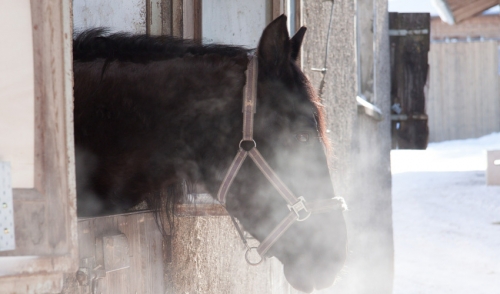Treating Seasonal Hot Spots on Pets
Hot spots can be uncomfortable for your pet, but how can you treat this itchy irritation? Understanding more about hot spots can help you give your pet relief...

Cold temperatures and brisk winter air may be refreshing for a deep breath or brief outdoor walks, but winter leads to many air quality issues that can create severe respiratory problems in horses, particularly in barns. While barns may keep horses safe and warm in the winter, poor ventilation can lead to a range of health concerns. Fortunately, there are several ways to improve winter air quality and keep horses breathing easy.
Winter Barn Air Quality and Horse Health Issues
When horses are stabled in secure barns in winter, they are warm, but they are also at risk from poor air quality. Inadequate ventilation means dust and hay particles, mold spores and other airborne particles are at higher concentrations. Training in indoor arenas, stall sweeping and hay feeding can also increase the particulate count in winter barns. When horses develop respiratory problems, they can show a variety of symptoms such as…
When respiratory problems go untended, horses may develop pneumonia or other severe problems, such as a heave line in their abdominal muscles. While individual symptoms can be treated, if the underlying poor air quality is not addressed, the horse's wind and lung capacity may be dramatically reduced and it could take weeks or months to recover.
Improving Air Quality in Winter Barns
Fortunately, there are many easy ways to improve air quality in winter barns. The most common and effective options include…
The most effective way to control winter barn air quality is to use multiple techniques and carefully monitor horses for any signs of respiratory distress or discomfort. When breathing irregularities are noticed, it is imperative to seek veterinary help as soon as possible for proper diagnosis and treatment before long term problems develop.
We are constantly adding new specials to our site. Be sure to check back often!


Hot spots can be uncomfortable for your pet, but how can you treat this itchy irritation? Understanding more about hot spots can help you give your pet relief...
Comments